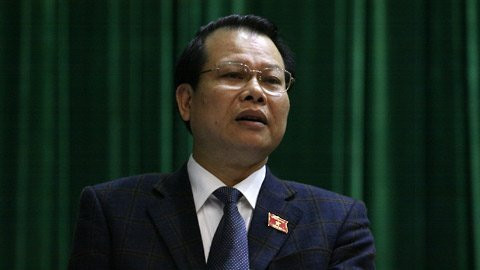The National Assembly discussed the draft amendment to the Law on Tax Administration.
Regarding current tax management, Deputy Prime Minister Vu Van Ninh frankly commented: Vietnam often "let the chickens out to chase". Debt arrears and tax losses are also due to late payment and temporary import and re-export without control.
Penalty of 0.07%/day is not low
At the National Assembly group discussion session on the draft amendment to the Tax Administration Law this morning, June 1, Representative Huynh Thanh Lap, Ho Chi Minh City, complained that in 2011 alone, the city still had 1,426 billion VND in overdue tax debt. Because the penalty for late tax payment is not feasible, as Representative Vo Thi Dung commented.
Not only that, these two deputies were also very concerned when they saw that the draft law stipulated two different tax penalties for the same violation.
 |
Deputy Prime Minister Vu Van Ninh. Photo: Le Anh Dung |
For example, Article 92 of the draft stipulates that the gradual payment of tax arrears is considered based on the taxpayer's request and has a guarantee from a credit institution. Taxpayers must pay late payment fees at a rate of 0.05%/day calculated on the amount of tax overdue. However, Article 106 states that if taxpayers pay tax late compared to the prescribed deadline, the tax payment extension deadline, the deadline stated in the tax authority's notice, or the deadline in the tax authority's handling decision, they must pay the full amount of tax and late payment fees at a rate of 0.07%/day calculated on the amount of tax overdue.
Delegate Dung wondered: "Why did the drafting agency propose two different fines for the same late payment? If it is the same act, the fine should be the same, either 0.05% or 0.07%."
However, no matter the level, according to Deputy Vo Kim Cu, "our penalties tend to be lenient, so businesses continue to violate and pay fines without any problem. Therefore, the debt is prolonged, and the appropriation continues from year to year. In the end, businesses that do the right thing suffer, while businesses that break the law benefit."
Regarding the tax penalty, Deputy Prime Minister Vu Van Ninh, a member of Nam Dinh province, has a different opinion. He said: "Actually, the penalty for late tax payment of 0.7%/day is not low, equivalent to 25%/year. Such a penalty is not small. Many businesses do not have the strength to pay the full amount at once."
Besides, Deputy Huynh Thanh Lap pointed out another contradiction: the law only allows debt cancellation for state-owned enterprises but not for other business sectors.
“That is unfair. I do not understand what the drafting committee means here,” said delegate Lap.
New open mechanism, no tax evasion for businesses
Giving general comments on the draft amendment to the Law on Tax Administration, Deputy Vo Kim Cu emphasized the need for publicity and transparency in taxes. “Otherwise, it will be a breeding ground for loss.”
“Tax violations have become common. Inspections are only done once every five years, and sometimes businesses operate haphazardly and then close down, and the tax misappropriation is gone without the government knowing. Businesses can just misappropriate taxes, and they don’t have to worry about borrowing from banks,” added Deputy Chieu (Finance and Budget Committee).
Mr. Chieu concluded: "With Vietnam's mechanism, it is not strange that businesses do not evade taxes."
Deputy Prime Minister Vu Van Ninh shared: “In other countries, people are more afraid of taxes than the police. If discovered to have committed tax violations, sometimes businesses go bankrupt. Vietnam is different.”
“However, in Vietnam, we often let the chickens out to chase, with late payment and temporary import and re-export, so tax arrears are mainly due to this activity and losses also come from that,” Mr. Ninh commented.
In addition, according to the analysis of this former Minister of Finance, our management of tax exemptions is not strict. Many cases cannot be handled because when discovered, the enterprise has gone bankrupt and cannot be traced. The tax debt is hanging there, accumulating.
Or like the case of importing public cars, because it is a budget expense, instead of the government paying, we exempt taxes. But there are many cases of cheap Lexus but the assets are transformed.
“I hope that tax policy does not incorporate too many other policies, such as social security policy. This makes it difficult to manage and easy to take advantage of the policy. In my opinion, the state should spend what it has to spend. The simpler, more transparent, and better managed the tax policy is, the more complicated the regulations are, the more revenue is lost,” Deputy Prime Minister Ninh expressed.
According to Vietnamnet - H






